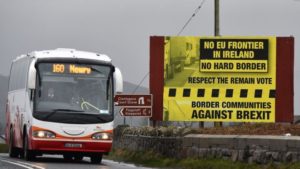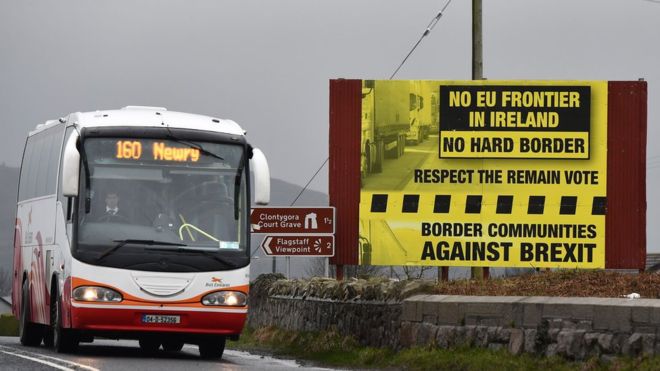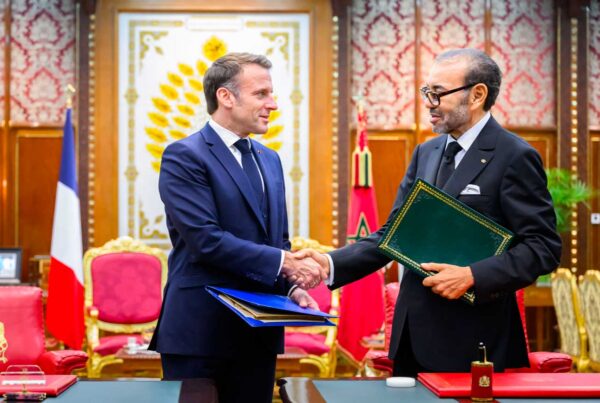By Kevin O’Leary

A sign greeting road users at the Irish border. Source: Getty Images
Brexit is a tremendous challenge for Britain. For Northern Ireland, it could be fatal.
In 2021, Northern Ireland will celebrate a century of existence as a political entity. The profound effect of Brexit however could mean that this small statelet, comprised of less than two million inhabitants, may barely even make it to its own centenary. A referendum on unifying with the Republic of Ireland has become seemingly inevitable in the very near future, thanks to the uncertainty unleashed by the Brexit vote on those living on the northern side of the Irish border. Should voters endorse such a measure, it would represent the first re-alignment of national sovereign territory in Western Europe since German reunification, and bolster similar independence movements in Scotland and Catalonia.
Though the Irish War of Independence ended in 1921, Irish politics has remained heavily dominated by the island’s relationship with its nearest neighbour. The two main political parties in the Republic of Ireland, Fine Gael and Fianna Fáil, trace their roots back to the Irish Republican Army (IRA) that achieved independence nearly a century ago.
Northern Ireland has become the preserve of the Democratic Unionist Party (DUP), whose primary objective is to keep this part of the island within the confines of the United Kingdom, and Sinn Féin, a party that until recently comprised the political wing of the Provisional IRA, whose violent thirty-year campaign to end British rule in Northern Ireland only came to a halt in the late 1990s. In a territory deeply divided by two clans, the DUP by and large represent the unionist/loyalist community, who support the union with Britain, while Sinn Féin represent the nationalists/republicans, whose ultimate political goal is a united Ireland.
With such a complex and intense relationship with Britain spanning the entirety of the last century, the Irish were left dumbfounded by the lack of attention given to the Irish question in the run-up to the Brexit vote. It often feels like the British don’t notice that we exist, and don’t even realize that they are still in control of the north-eastern corner of our island.
The Leave campaign wants the UK to leave the EU’s customs union and single market, which is fine, except that it threatens to bring down the entire Northern Irish state, and in the process utterly destroy what unionists have devoted a century of their existence to protecting, chiefly from several prolonged IRA campaigns aimed at achieving such a demise.
The last two decades have seen Northern Ireland slowly recover from the Troubles, a vicious conflict that lasted from the late 1960s until the late 1990s, claiming the lives of more than 3,500 people. The Good Friday Agreement of 1998, a comprehensive settlement that was painstakingly negotiated between Irish political parties and paramilitaries as well as Irish, British and American diplomats over four years, acknowledged the need for an open border between north and south in order to return normality to the war-torn region.
A hard Brexit would put paid to all that, with Michel Barnier, the EU’s chief Brexit negotiator, warning that checks along the Irish border are inevitable in the event of the UK leaving the customs union. Such checks would have the twin impact of hampering the lucrative trade Northern Ireland conducts with the Republic, while also evoking strong memories of the dark days of British soldiers being permanently stationed on the border to counter the flow of IRA personnel and arms between the two jurisdictions.
In 2006, I made my first road trip to Northern Ireland. Upon approaching the border, the traffic along the Dublin to Belfast route came to a complete halt. Anticipating a permanent security checkpoint with soldiers and armed policemen, my family prepared our passports and got ready for invasive questioning about our reasons for crossing the border. As it was, traffic had simply stopped because a local farmer had decided to use the busiest road in Ireland to herd his cattle from one field to another. Such is life in Ireland.
If it had been ten years earlier, it would have been soldiers and policemen. In the event of a hard border post-Brexit, they will be back. The Irish don’t want to be interrogated by British soldiers every time they decide to travel from one part of their island to another. The resentment such a return would cause, in addition to damage caused to cross-border trade that would result from the loss of the customs union, would be disastrous for the fragile Northern Irish economy and for the stability that the peace process has enabled to blossom in recent years.
As one of the poorest regions in the United Kingdom, Northern Ireland has been the beneficiary of substantial EU structural & development funding for decades, and all of this money will dry up in the event of Brexit. Unique to this region, a special EU “Peace Fund” has already supplied £1.5 billion worth of money specifically targeted at fostering cross-community co-operation and steering both sides away from isolation and tension. While the structural & development funds will disappear post-Brexit, it is unclear whether or not the EU will still provide the Peace Fund. These issues would not arise in the event of a united Ireland; the Republic’s border counties currently receive substantial structural funding and the Peace Fund would still apply to an area inside EU borders if Ireland was a single political entity.
In the latter days of the Troubles, successive British governments sought to bring down unemployment and move people away from subversive activity through massive expansion of the public sector, to the point where about a third of the entire workforce is now on the government payroll. Despite huge pressure from the Tories, the public sector has not yet experienced the large cull that has been around the corner for some time now, and its occurrence would be severely damaging for the economy.
The citizens know that if re-unification occurred, this region would be part of the Republic of Ireland’s economy, which is noted for a much smaller public sector, a diversified economy led by pharmaceutical and IT companies, and a wealthier society that has thrived without reliance on significant government spending or financial backing from Westminster. In contrast, the North has only survived the past 50 years thanks to large sums from both Westminster and Brussels, while a successful and expansive private sector has never taken off the way it has south of the border. With the lure of the common market added to the mix, many of those previously opposed to unity are now licking their lips.
Throughout the history of Northern Ireland, the state’s greatest supporters on mainland Britain have been the Conservatives. It was Margaret Thatcher who famously declared herself a “unionist” and “loyalist” at the signing of the 1985 Anglo-Irish Agreement, an accord Thatcher hoped would crush Sinn Féin and keep the Dublin government as uninvolved in Northern Ireland as possible. How ironic then that it would be a referendum called by the Tories that has effectively set a timer on the conclusion of Northern Ireland’s existence.
Despite the ramifications Brexit is having and indeed was expected to have, the DUP supported the Leave campaign. That marked them out as the only major pro-Leave party in a region that ultimately voted 56% in favor of Remain. The party’s long history of Euroscepticism goes all the way back to when Ian Paisley, the party’s founder, took a prominent role in urging a vote to leave the EEC in the 1975 referendum. From an outsider’s perspective, it is difficult to consider the DUP’s pro-Brexit stance to be anything other than a desire to cloak itself as much as possible in British ultra-nationalism, banishing any ordering from Brussels, even though the very same body pumps so much money into the region.
Brexit has already proven itself to be the purveyor of unintended outcomes, and this may well be the most surprising of all; that in 2016, the two most pro-Northern Ireland parties in the United Kingdom campaigned for an outcome which has almost certainly hastened the downfall of Northern Ireland itself. With demographics moving the region towards a nationalist majority anyway, the probability of imminent re-unification has become all the more likely.
The Irish problem is one of which other European nations would do well to take note. In voting for independence from the EU, the British have inadvertently sparked back to life an independence movement within their own borders. Irish nationalists hoped that a Yes vote in the 2014 Scottish independence referendum would give momentum to their own cause. Now, it appears that it will be the Irish breathing life back into the Scottish independence movement. Nations on the continent should be conscious of what has occurred on these isles and how it pertains to their own internal territorial disputes.
During their long and arduous military campaign, the Provisional IRA coined the Irish language phrase “Tiocfaidh ár lá“, which translates into English as “our day will come”, that day of course being a united Ireland.
The astounding reality is however that almost a quarter of a century after the guns fell silent, it will not be the nationalist movement in Ireland that will have brought forward Irish unity, but the British right-wing, itself so long the primary foe of such a momentous event.
And with it, Britain’s 800-year control of Irish land will be finally at an end.
Other posts that may interest you:
- The Trouble with ‘Ecocide’
- Carbon dioxide removal – hit or miss?
- Local Victories for Turkish Opposition — A Sign of Hope?
- Are France and Japan a Mismatch Made in Heaven?
- A Reflection on Dark Tourism
Discover more from The Sundial Press
Subscribe to get the latest posts sent to your email.





